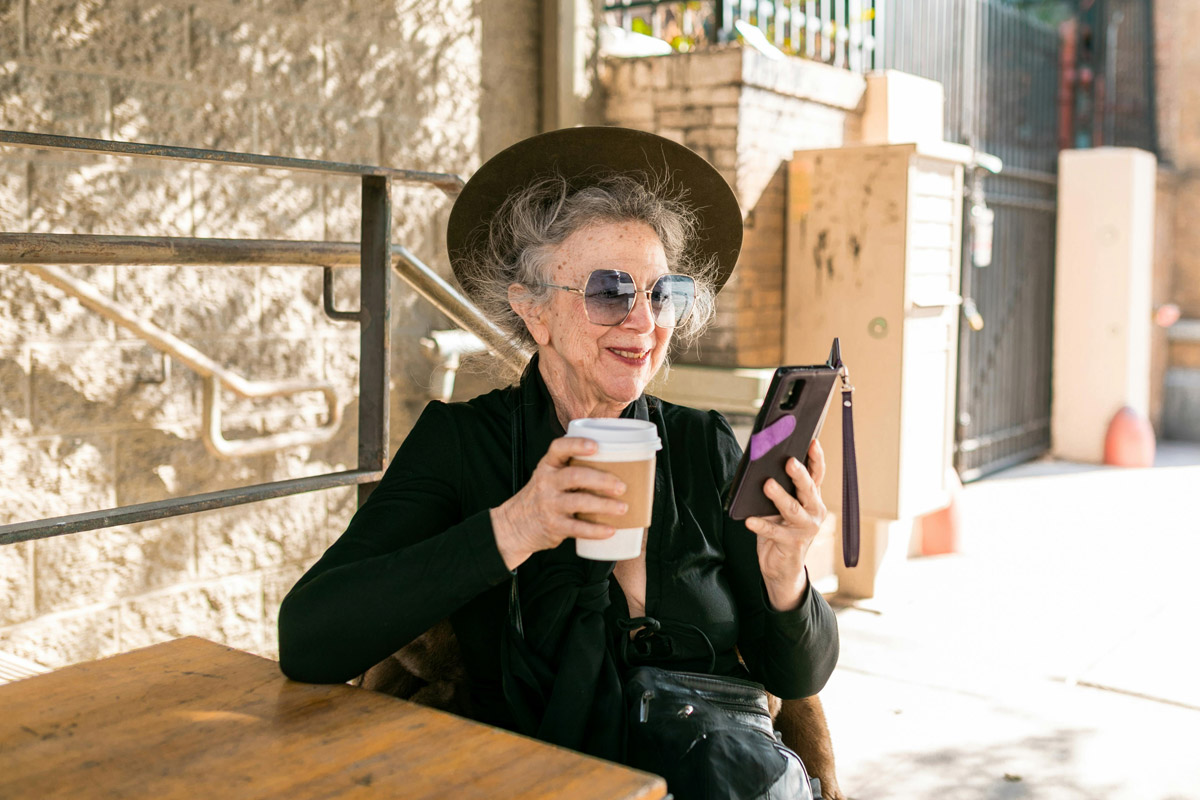
Mornings are rough for this night owl. When the alarm shocks me into semi-consciousness and I come crashing back down into what passes for reality in these times, my first rudimentary thought is always, “Coffee. Where. Find. NOW.” Half the time the drink doesn’t even satisfy, and I have to grab water for the real quench my body is seeking. Yet the compulsion is so strong between waking and sniffing out where/when/how to get my java fix. Well, good news for us addicts enthusiasts: a new study says drinking one to three small cups of coffee a day helps women age better, huzzah! (Sorry Pedro Pascal, your daily six shots of espresso are still medically unsound.) Research for the study was led by Dr. Sara Mahdavi at Harvard, and the findings were presented at an American Society for Nutrition convention on Monday. Pour yourself a cup and let these stats percolate:
Ladies first: Following 30 years of analyzing almost 50,000 women’s dietary habits, researchers determined that a morning cup of coffee “might do more than boost energy; it could also help women stay sharp, strong and mentally well as they age,” according to a press release. Data from women who were part of the Nurses’ Health Study began to be collected in 1984. When they enrolled, the participants were aged between 45 and 60 and filled out surveys providing details about their diet and health.
How the test was run: “The researchers assessed caffeine intake using validated food frequency questionnaires that included consumption of top contributors of caffeine such as coffee, tea, cola and decaffeinated coffee,” according to the press release. “Healthy aging was defined as living to age 70 or older, being free from 11 major chronic diseases, maintaining physical function, having good mental health, exhibiting no cognitive impairment and showing no memory complaints,” it added.
1-3 daily cups of coffee supported healthy aging: Researchers found that “healthy agers” typically consumed an average of 315 mg of caffeine per day — roughly the amount of three small cups of coffee or one and a half large cups by today’s standards. “More than 80% of that caffeine came from regular coffee consumption,” per the press release. “For women in the healthy agers group, each extra cup of coffee per day was tied to a 2% to 5% higher chance of doing well later in life.” … “Women who drank one to three cups of caffeinated coffee per day in their 50s were more likely to reach older age free from major chronic diseases and with good cognitive, physical, and mental health,” Mahdavi said of the study, according to the outlet.
Not all caffeines are created equal: “The health benefits appeared specific to coffee, rather than caffeine more broadly,” Mahdavi told the outlet, adding, “We didn’t see the same associations with decaf coffee, tea or caffeinated soda — suggesting that coffee’s unique combination of bioactive compounds may play a key role.”
Some caffè caveats: “Moderate coffee intake may offer some protective benefits when combined with other healthy behaviors, such as regular exercise, a healthy diet and avoiding smoking,” Mahdavi said, per Fox News Digital. “We don’t recommend starting coffee if you don’t already drink it or if you’re sensitive to caffeine. But for people who already consume moderate amounts — typically two to four cups per day — this study adds to the evidence that coffee can be part of a healthy lifestyle,” she added.
Hold the mug, I’m a little confused: “Each extra cup of coffee per day was tied to a 2% to 5% higher chance of doing well later in life.” Are the extra cups they’re talking about the second and third cups, or are they talking about an extra 2-5% bump for any coffee beyond that third cup? And why aren’t we measuring in ounces?! I went to the original press release, and the rest of the sentence (that People Mag didn’t excerpt) continues with, “up to five small cups per day, or about 2.5 cups according to today’s measures.” So yes? The 2-5% higher chance of doing well refers to cups four and five? I’m still unsure, clearly I haven’t had enough coffee. Also, we all take our coffee differently. How do the endless varieties of milks, sugars, and sweeteners affect these results?
All in all, though, after the onslaught of studies that were telling us to reduce, delay, or eliminate coffee altogether, it’s refreshing to have other research stirring the pot in support of the potent brew. And to have this study be specifically about women?! Well, yes, it made me glad. But then I became worried that highlighting the benefit for women would trigger republicans into banning coffee outright in America, rather than letting us have a win. I’m pretty bitter these days, like my coffee.
Photos credit: Mike Jones, RDNE Stock Project and Clementina Toso on Pexels













Yes, the ‘extra cups’ refers to caffeine beyond the initial beneficial dose of three small cups cited in the study. (Longtime science writer here :). Also, yay coffee!
Coffee lobbyist and PR are trying to get people to stop drinking Matchas.
No, truly they aren’t☺️ I also love tea, but on most scientifically measurable health benefits, coffee actually wins.
There really is a slew of evidence coffee (without sugar/ sugar substitutes/ additives) is very beneficial for most people. It’s highly, highly recommended for anyone who has any kind of gastrointestinal cancer risk (from mouth to butt), because a coffee habit definitely helps your survival chances. There’s been a ton of research in Europe, and it’s shown protective with mood disorders, cognition, heart disease, diabetes, and more. Decaf also has many of the benefits of “real” coffee (though not the taste!). Also many Dutch people have a gene that speedily processes caffeine–I don’t and limit my coffee consumption to the first half of my day.
I found this in English: https://zoe.com/learn/health-benefits-of-coffee
Who paid for this study?
Just a note, nine of my young adults kids and their friends drink coffee. Coffee for old people they say. WHAT!
“Each extra cup of coffee per day was tied to a 2% to 5% higher chance of doing well later in life.”
I mean, it is also probable people who are successful and hardworking consume more coffee in order to concentrate better. I started drinking coffee while studying for my university exams. People who don’t do much can still enjoy coffee, but I don’t think they would feel the need that much if they aren’t working on something and in need of concentration and alertness of caffeine.
I’m always skeptical of these studies. Ever since I found out the “red wine is good for you” study was BS. But hey I drink 3 cups of coffee per day so good for me.
I think they should be more specific about “cups”. 8 ounces? 6 ounces? A giant Stanley cup?
SNORT! 20 years ago, a giant Stanley cup would have held my first morning ice coffee.
Yeah, those references to ‘small’ cups vs. today’s ‘modern’ cups are a bit confusing. I also don’t quite understand the lack of recommending people take up coffee drinking; they seem to say if you do, great! you’re going to age well, but they don’t recommend incorporating drinking coffee if you don ‘t already do so. Plus the drinking coffee was combined with regular exercise, not smoking, etc., so—is it the coffee?
My gastric reflux begs to differ on the benefits of drinking coffee. For me. If you don’t have the problem, then enjoy your cup(s) o’ joe.
One more thing I get to thank Meghan and Celebitchy for! Lol. I’ve never liked coffee, because I haven’t tried any that tastes as wonderful as it smells. I’m totally on Team Tea. But I recently tried Clevr Blends Mocha latte — so, I’m getting there.
3-2-1 until another study directly contradicts this one. I love coffee, have tried to give it up to control my anxiety and just felt sad and unmotivated for weeks until I went back to it. But I’m not at all concerned about what studies say. Coffee works for me. Do what works for you.
I enjoy coffee and tea, hot and iced, so this is nice but I agree that it’s a little confusing. It’s also in no way a guarantee of anything. If there was one consistent thing in my mom’s life, it was her daily coffee. And now she’s languishing in a memory care facility with Alzheimer’s. Still, every effort we can make to improve our health will hopefully boost our chances for smoother aging.
Yeah, I was thinking of my gramma who according to my mom always had a pot of coffee on the stove–all day long. Alzheimer’s AND diabetes.
It’s in my family, too. Alzheimers is a female illness–it affects far more women than men, especially after age 80. Obviously diet and movement does help as opposed to not. Social contact throughout life is protective. Stress, alcohol, low education, etc are not. But if it’s in your family, delaying its onset is what you’re after, especially since up to now any medications seem to work best in men (who are less likely to have Alzheimer’s in the first place).
Learning something that takes effort is protective. Mastering a musical instrument and learning a foreign language are examples. Alzheimer’s sucks!
Maybe it’s better to think of how coffee can help as a nudge, tweak, step(s) in the right direction? Like coffee drinkers generally had less severe Covid than non-drinkers, BUT you’re comparing a pretty gnarly sickness. Not being in ICU doesn’t mean doing great, right? It’s not an RFK Jr type of cure: it’s better to get a vaccination than count on being a coffee drinker.
I’m sorry to hear about your mom, OrangeOwl. It’s so sad watching someone you love lose their personality, memories, speech and self. It’s hard on care givers and it’s sad repeating conversation loops or worrying about your loved one wandering off. You’re definitely understood by those of us who’ve gone through this–wishing you lots of strength and offering a virtual hug if you need it.
Coffee and tea consumption are important enough to go on people’s medical records. Coffee is a diuretic and will eventually dry out your skin. It also wears out the adrenals over time. Yes, there are benefits, but overconsumption isn’t good at all. It’s said that it IS good for the prostate gland in males.
I am also confused by this “study” – I don’t trust the correlation they are making between multiple cups of coffee and good health. That should be something that can explain biologically, instead of by some survey (which can have bias built in).
How are they confirming it is coffee and not some other related factors? For example, people who drink coffee may be the type of people who are more motivated to exercise. To make it statistically relevant that it is just coffee, they have to make sure it is not things like exercise, and diet, and various other factors that may be related to the type of people who drink coffee. Coffee drinking may also indicate a certain economic class that can afford several cups of coffee a day.
This sort of People press release of bad science really annoys me. It’s a headline grabbing nothing-burger